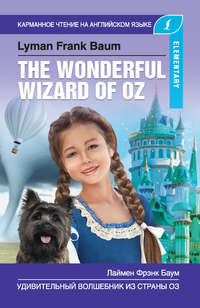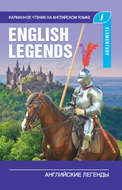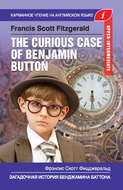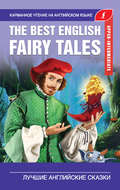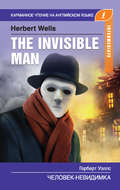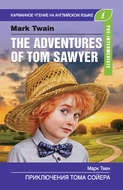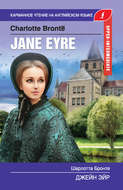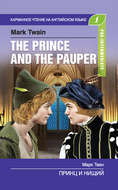Loe raamatut: «Удивительный волшебник из Страны Оз / The Wonderful Wizard of Oz»
© Дубиковская И.Г., адаптация текста
© ООО «Издательство АСТ», 2019
Chapter 1
The Cyclone
Dorothy lived in the middle of the great Kansas prairies, with Uncle Henry, who was a farmer, and Aunt Em, who was the farmer’s wife. Their house was small. There was only one room; and this room contained a rusty cookstove, a cupboard for the dishes, a table, three chairs, and two beds: one big one for the Uncle and Aunt and one small one for Dorothy. There was no attic, but there was a small hole dug in the ground, called a cyclone cellar. That’s where the family could go in case one of those great whirlwinds happened.
There was nothing but the great gray prairie on every side, not a tree nor a house; just flat country that reached to the edge of the sky in all directions. The earth was gray and dry, with little cracks running through it. Even the grass was not green, burned by the sun to be the same gray color. Once the house had been painted, but now it was as dull and gray as everything else.
When Aunt Em first came here, she was young and pretty. The sun and wind had changed her, too, and turned her gray. She was thin, and never smiled now. When Dorothy, who was an orphan, first came to her, Aunt Em was always scared by the child’s laughter and would scream and press her hand to her chest.
Uncle Henry never laughed. He worked hard from morning till night and did not know what joy was. He was gray also, from his long beard to his rough boots.
It was Toto that made Dorothy laugh, and saved her from becoming gray. Toto was a little black dog, with silky fur and small black eyes. Toto played all day long, and Dorothy played with him. She loved him very much.
Today, however, they were not playing. Uncle Henry sat upon the doorstep and looked anxiously at the sky. It was even grayer than usual. Dorothy held Toto in her arms, and looked at the sky too. Aunt Em was washing the dishes.
They heard a low wail of the wind in the north. Then came a sharp whistling from the south.
Suddenly Uncle Henry stood up.
“There’s a cyclone coming, Em,” he called to his wife. “I’ll go look after the stock.” Then he ran toward the sheds where the cows and horses were kept.
Aunt Em dropped her work and came to the door. “Quick, Dorothy!” she screamed. “Run for the cellar!”
Toto jumped out of Dorothy’s arms and hid under the bed, and the girl ran to get him. Aunt Em was very afraid. She threw open the trap door in the floor and climbed down the ladder into the small, dark hole. Dorothy caught Toto at last and ran to do the same. When she was halfway across the room, the house shook so hard that she fell down.
Then a strange thing happened.
The house whirled around two or three times and rose slowly through the air. Dorothy felt as if she were going up in a balloon.
The house was in the exact center of the cyclone. The great pressure of the wind on every side of the house raised it up higher and higher, until it was at the very top of the cyclone, which carried it as easily as a feather.
It was very dark, and the wind howled horribly. However, Dorothy thought it wasn’t so bad. She felt as if she were being rocked gently, like a baby in a cradle.
Toto did not like it. He ran about the room, barking loudly.
Hour after hour passed away. Dorothy wondered if she would be dashed to pieces when the house fell again. But hours passed and nothing terrible happened. She stopped worrying and decided to wait calmly. Eventually, she crept to her bed, and lay down upon it; and Toto followed and lay down beside her.
Dorothy soon closed her eyes and fell asleep.
Chapter 2
The Council with the Munchkins
She was awakened by a jolt. If Dorothy had not been lying on the soft bed she might have been hurt. Toto put his cold little nose into her face and whined terribly.
Dorothy sat up and noticed that the house was not moving. Bright sunshine came in at the window. She got up from her bed and with Toto at her heels ran and opened the door.
The little girl gave a cry of amazement and looked about her. The cyclone had set the house down in the middle of a beautiful country. There were green plants and flowers everywhere, and trees with fruit on them.
While she was looking at the strange and beautiful sights, she noticed something. Towards her was walking a group of the strangest people she had ever seen. They were all very small. In fact, they seemed about as tall as Dorothy, although they looked much older.
Three of them were men and one was a woman. They all wore tall pointy hats, with little bells around the brims that tinkled sweetly as they moved. The hats of the men were blue; the little woman’s hat was white, and she wore a white pleated dress. The men were dressed in blue, the same shade as their hats, and wore well-polished boots. The men, Dorothy thought, were about as old as Uncle Henry, for two of them had beards. But the little woman was much older. Her face was covered with wrinkles and her hair was nearly white.
When they got near the house where Dorothy was standing in the doorway, they paused and whispered among themselves, as if afraid to come farther. But the little old woman walked up to Dorothy, made a low bow and said, in a sweet voice:
“You are welcome, most noble Sorceress, to the land of the Munchkins. We are so grateful to you for having killed the Wicked Witch of the East, and for setting our people free.”
Dorothy didn’t understand. What could the little woman possibly mean by calling her a sorceress, and saying she had killed the Wicked Witch of the East?
The little woman evidently waited for her to answer; so Dorothy said, with hesitation, “You are very kind, but there must be some mistake. I have not killed anything.”
“Your house did, anyway,” replied the little old woman, with a laugh, “and that is the same thing. See!” she continued, pointing to the corner of the house.
Dorothy looked, and gave a little cry of fright. There, just under the corner of the house, two feet were sticking out, with silver shoes with pointed toes.
“Oh, dear! Oh, dear!” cried Dorothy, clasping her hands together in dismay. “The house must have fallen on her. Whatever shall we do?”
“There is nothing to be done,” said the little woman calmly.
“But who was she?” asked Dorothy.
“She was the Wicked Witch of the East, as I said,” answered the little woman. “We were her slaves, but now we are free, and are grateful to you for the favor.”
“Who are the Munchkins?” inquired Dorothy.
“They are the people who live in this land of the East where the Wicked Witch ruled.”
“Are you a Munchkin?” asked Dorothy.
“No, but I am their friend, although I live in the land of the North. When they saw the Witch of the East was dead the Munchkins sent a swift messenger to me, and I came at once. I am the Witch of the North.”
“Oh, gracious!” cried Dorothy. “Are you a real witch?”
“Yes, indeed,” answered the little woman. “But I am a good witch, and the people love me.”
“But I thought all witches were wicked,” said the girl.
“Oh, no, that is a great mistake. There were only four witches in all the Land of Oz, and two of them, those who live in the North and the South, are good witches. I know this is true, for I am one of them myself, and cannot be mistaken. Those witches in the East and the West are wicked; but now that you have killed one of them, there is only one Wicked Witch in all the Land of Oz–the one in the West.”
“But,” said Dorothy, after a moment’s thought, “Aunt Em has told me that there were no witches.”
“Who is Aunt Em?” inquired the little old woman.
“She is my aunt who lives in Kansas, where I came from.”
The Witch of the North seemed to think for a time. Then she said, “I do not know where Kansas is. Is it a civilized country?”
“Oh, yes,” replied Dorothy.
“Ah. In the civilized countries there are no witches left, nor wizards, nor sorceresses, nor magicians. But, you see, the Land of Oz has never been civilized, for we are cut off from all the rest of the world. Therefore we still have witches and wizards amongst us.”
“Who are the wizards?” asked Dorothy.
“Oz himself is the Great Wizard,” answered the Witch, sinking her voice to a whisper. “He is more powerful than all the rest of us together. He lives in the City of Emeralds.”
The little old woman looked at the corner of the house again. The feet of the dead Witch had disappeared entirely, and nothing was left but the silver shoes.
“The silver shoes are yours,” explained the Witch of the North, “and you shall wear them.” She reached down and picked up the shoes, then gave them to Dorothy.
“The Witch of the East was proud of those silver shoes,” said one of the Munchkins, “and they are magical; but we don’t know what they can do.”
Dorothy carried the shoes into the house and placed them on the table. Then she came out again to the Munchkins and said:
“I want to to get back to my aunt and uncle. Can you help me find my way?”
The Munchkins and the Witch first looked at one another, and then at Dorothy, and then shook their heads.
“At the East, not far from here,” said one, “there is a great desert, and none could live to cross it.”
“It is the same at the South, in the country of the Quadlings.”
“I am told,” said the third man, “that it is the same at the West. And that country, where the Winkies live, is ruled by the Wicked Witch of the West, who would make you her slave if you passed her way.”
“The North is my home,” said the old lady, “and at its edge is the same great desert that surrounds this Land of Oz. I’m afraid, my dear, you will have to live with us.”
Dorothy began to cry. The kind-hearted Munchkins began to cry as well. The little old woman took off her cap and balanced the point on the end of her nose. She counted “One, two, three”, and the cap changed to a slate, on which was written in big letters:
“LET DOROTHY GO TO THE CITY OF EMERALDS”
The little old woman read the words and asked, “Is your name Dorothy, my dear?”
“Yes,” answered the child.
“Then you must go to the City of Emeralds. Perhaps Oz will help you.”
“How can I get there?” asked Dorothy.
“You must walk. It is a long journey. However, I will use all the magic I know to keep you from harm.”
“Won’t you go with me?” pleaded the girl, who had begun to look upon the little old woman as her only friend.
“No, I cannot do that,” she replied, “but I will give you my kiss, and no one will dare injure a person who has been kissed by the Witch of the North.”
She came close to Dorothy and kissed her gently on the forehead. Where her lips touched the girl they left a round, shining mark, as Dorothy found out soon after.
“The road to the City of Emeralds is paved with yellow brick,” said the Witch, “so you cannot miss it. Good-bye, my dear.”
The Witch gave Dorothy a friendly little nod, whirled around on her left heel three times, and disappeared. Toto was very surprised and barked loudly. But Dorothy, knowing her to be a witch, had expected her to disappear in just that way, and was not surprised at all.
Chapter 3
How Dorothy Saved the Scarecrow
When Dorothy was left alone she began to feel hungry. So she went inside the house and got some bread and butter from the cupboard. She gave some of it to Toto. She then took a pail from the shelf and carried it down to the little brook and filled it with water. Then she saw some fruits on the trees and decided to get them for her breakfast.
Then she went back to the house, and having helped herself and Toto to some food and water, she set about making ready for the journey to the City of Emeralds.
Dorothy had only one other dress. It was gingham, with checks of white and blue; and although the blue was somewhat faded with many washings, it was still pretty. The girl washed herself carefully and dressed herself in the clean dress. She took a little basket and filled it with bread from the cupboard, laying a white cloth over the top. Then she looked down at her feet and noticed how old and worn her shoes were.
“They surely will fall apart in the long journey, Toto,” she said.
At that moment Dorothy saw lying on the table the silver shoes that had belonged to the Witch of the East.
“I wonder if they will fit me,” she said to Toto.
She tried on the silver ones, and they fit her so well as if they had been made for her.
Finally she picked up her basket.
“Come along, Toto,” she said. “We will go to the Emerald City and ask the Great Oz how to get back to Kansas again.”
She closed the door, locked it, and put the key carefully in the pocket of her dress. And so they started their journey.
There were several roads nearby, but they took the one paved with yellow bricks. Within a short time she was walking briskly toward the Emerald City. The sun shone bright and the birds sang sweetly.
She was surprised how pretty this country was. There were neat fences at the sides of the road, painted blue, and beyond them were fields of grain and vegetables. The Munchkins were good farmers. Once in a while she would pass a house, and the people came out to look at her. The houses of the Munchkins were round, with big domes for roofs. All were painted blue, for in this country of the East blue was the favorite color.
Toward evening, when Dorothy began to wonder where she should pass the night, she came to a house larger than the rest. On the green lawn before it many men and women were dancing. Five little fiddlers played as loudly as possible, and the people were laughing and singing. There was a big table nearby, with delicious fruits and nuts, pies and cakes, and many other good things to eat.
The people greeted Dorothy kindly, and invited her to pass the night with them.
Dorothy stayed with the Munchkins, she ate and talked to them, and then she went to sleep in the house, with Toto curled up on the blue rug beside her.
The next morning she told the Munchkins good-bye, and again started along the road of yellow brick. When she had gone several miles she decided to rest. There was a great cornfield nearby, and not far away she saw a Scarecrow, placed high on a pole to keep the birds from the ripe corn.
Dorothy looked at the Scarecrow. Its head was a small sack stuffed with straw, with eyes, nose, and mouth painted on it to represent a face. Ih has an old, pointed blue hat and a blue suit of clothes, worn and faded, which had also been stuffed with straw. On its feet were some old boots with blue tops.
While Dorothy was looking at the Scarecrow, she was surprised to see one of the eyes slowly wink at her. She thought she must have been mistaken at first, but then the figure nodded its head to her in a friendly way. Dorothy walked up to it, while Toto ran around the pole and barked.
“Good day,” said the Scarecrow.
“Did you speak?” asked the girl, in wonder.
“Certainly,” answered the Scarecrow. “How do you do?”
“I’m pretty well, thank you,” replied Dorothy politely. “How do you do?”
“I’m not feeling well,” said the Scarecrow, with a smile, “for it is very tedious being perched up here night and day to scare away crows.”
“Can’t you get down?” asked Dorothy.
“No, for this pole is stuck up my back. If you will please take away the pole I shall be thankful.”
Dorothy reached up both arms and lifted the figure off the pole. He was stuffed with straw and was quite light.
“Thank you very much,” said the Scarecrow. “I feel like a new man. Who are you? And where are you going?”
“My name is Dorothy,” said the girl, “and I am going to the Emerald City, to ask the Great Oz to send me back to Kansas.”
“Where is the Emerald City?” he inquired. “And who is Oz?”
“Why, don’t you know?” she returned, in surprise.
“No, indeed. I don’t know anything. You see, I am stuffed, so I have no brains at all,” he answered sadly.
“Oh,” said Dorothy, “I’m awfully sorry for you.”
“Do you think,” he asked, “if I go to the Emerald City with you, that Oz would give me some brains? You see, I don’t mind my legs and arms and body being stuffed, because I cannot get hurt. But I do not want people to call me a fool, and if my head stays stuffed with straw instead of with brains, as yours is, how am I ever to know anything?”
“I understand,” said the little girl, who was truly sorry for him. “If you will come with me I’ll ask Oz to do all he can for you.”
“Thank you,” he answered gratefully.
They walked back to the road and started along the path of yellow brick for the Emerald City.
Toto did not like this addition to the party at first. He smelled around the stuffed man and often growled in an unfriendly way at the Scarecrow.
“Don’t mind Toto,” said Dorothy to her new friend. “He never bites.”
“Oh, I’m not afraid,” replied the Scarecrow. “He can’t hurt the straw. Do let me carry that basket for you. I shall not mind it, for I can’t get tired. I’ll tell you a secret,” he continued, as he walked along. “There is only one thing in the world I am afraid of.”
“What is that?” asked Dorothy.
“A lighted match,” answered the Scarecrow.
Chapter 4
The Road Through the Forest
After a few hours the road began to be rough, and it was difficult to walk. Some bricks were broken or missing altogether. Toto was jumping across the holes in the road and Dorothy walked around. As for the Scarecrow, having no brains, he walked straight ahead, and so stepped into the holes and fell at full length on the hard bricks. It didn’t hurt him, however, and Dorothy would pick him up and set him upon his feet again.
The farms here were not nearly as well cared as before. There were fewer houses and fewer fruit trees.
At noon they sat down by the roadside, near a little brook, and Dorothy opened her basket and got out some bread. She offered a piece to the Scarecrow, but he refused.
“I am never hungry,” he said.
Dorothy nodded and went on eating her bread.
“Tell me something about yourself and the country you came from,” said the Scarecrow, when she had finished her dinner. So she told him all about Kansas, and how gray everything was there, and how the cyclone had carried her to the Land of Oz.
The Scarecrow listened carefully, and said, “I cannot understand why you want to leave this beautiful country and go back to Kansas.”
“No matter how dreary and gray our homes are, there is no place like home.”
The Scarecrow sighed.
“I cannot understand it,” he said.
They went on. There were no fences at all by the roadside now, and the land was rough. Toward evening they came to a great forest, where the trees grew big and close together. It was almost dark under the trees, for the branches shut out the daylight; but the travelers did not stop, and went on into the forest.
“If this road goes in, it must come out,” said the Scarecrow, “and as the Emerald City is at the other end of the road. We must go wherever it leads us.”
“Anyone would know that,” said Dorothy.
“Certainly; that is why I know it,” returned the Scarecrow. “If it required brains to figure it out, I never should have said it.”
After an hour or so all the light faded away, and they found themselves in the darkness. Dorothy could not see at all, but Toto could, for some dogs see very well in the dark. The Scarecrow declared he could see as well as by day. So she took his arm and managed to get along fairly well.
“If you see any house, or any place where we can pass the night,” she said, “you must tell me.”
Soon after the Scarecrow stopped.
“I see a little cottage at the right of us,” he said, “built of logs and branches. Shall we go there?”
“Yes, indeed,” answered the child. “I am tired.”
The Scarecrow led her through the trees to the cottage. Inside, Dorothy found a bed of dried leaves in one corner. She lay down at once, and Toto lied down beside her. The Scarecrow, who was never tired, stood up in another corner and waited patiently until morning came.
Tasuta katkend on lõppenud.
